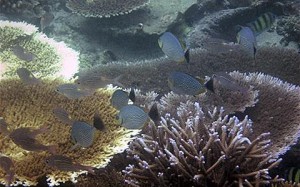20 August 2010
Scientists studying coral reefs off northwestern Indonesia say coral that survived the 2004 tsunami is now dying at one of the fastest rates ever. The cause, they say is a dramatic rise in water temperature and they warn the threat extends to other reefs across Asia.
Marine biologists from the Wildlife Conservation Society say in May they recorded surface water temperatures off the Indonesian island of Sumatra at 34 degrees Celsius. This is four degrees above long-term averages.
Massive bleaching
The teams discovered massive coral bleaching, which occurs when algae living inside coral tissues are expelled. The bleaching is caused by a combination of warmer water and greater exposure to sunlight unfiltered by clouds or wind.
Subsequent surveys by Australia’s James Cook University and Indonesia’s Syiah Kuala University showed 80 percent of those corals have since died. And that has serious implications for marine life, fishermen and communities across Asia.
Clive Wilkinson, a coordinator at the Global Coral Reef Monitoring Network in Australia, says scientists are seeing bleaching throughout the region.
“In sort of May, June, we started seeing massive bleaching in the Andaman Sea side and then in the Gulf of Thailand and now it is appearing to spread across through Indonesia and up into Vietnam and Southeast Asia. And it will possibly start to affect Taiwan and southern Japan very soon,” he said.
El Nino
Wilkinson says researchers have seen similar coral destruction in the past, the worst during the El Nino of 1998. An El Nino is a weather pattern marked by warmer ocean temperatures in the tropical Pacific, which can affect rainfall and droughts
Scientists estimate 16 percent of the world’s coral died during the 1998 El Nino. Given time, the reefs can recover when water temperatures return to normal. But there are concerns that global warming will slow or prevent that recovery.
“We’re sadly quite convinced that this is a climate change event,” Wilkinson said. “What’s happened is that there is far more energy in the atmosphere and in the oceans at the moment because of global warming. Which means that there will be far bigger swings in all the weather parameters.
International climate scientists say that greenhouse gas emissions, including carbon dioxide from burning fuels such as oil and wood, contribute to warmer global temperatures. Scores of nations have pledged to cut their greenhouse gas emissions, although many environmentalists say those cuts are not enough to reduce the damage from a warmer world.
Why reefs are important
Corals reefs are some of the most diverse ecosystems on earth. They occupy only one percent of the world’s ocean surface but provide a home for 25 percent of all sea life – including fish that millions of people rely on for food. The reefs also protect the coastlines of many islands in the Pacific from storm surges.
Before the bleaching began, the reefs in northern Indonesia were recovering from the 2004 earthquake near Sumatra that triggered a tsunami killing more than 230,000 people around the Indian Ocean. The disaster damaged more than a third of these reefs, but scientists say they were recovering faster than expected, thanks largely to natural colonization and a drop in illegal fishing.


[…] Indonesia’s Coral Reefs Dying Faster Than Expect… […]